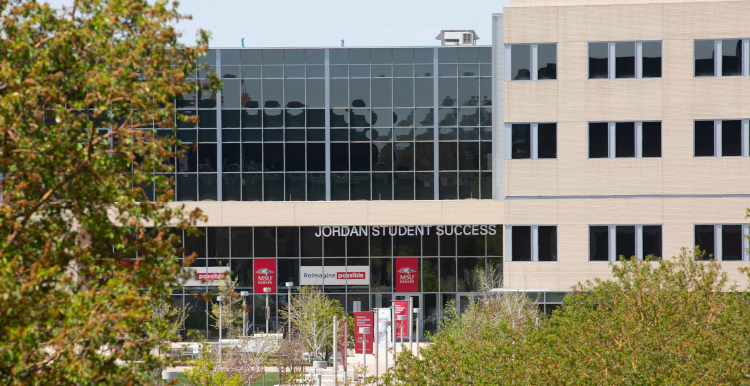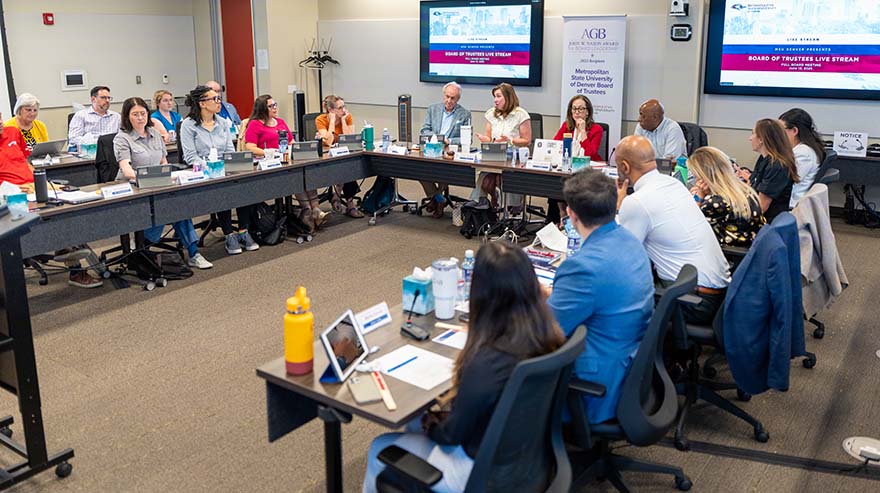Budget Recommendation Committee members met Friday to discuss tuition-rate recommendations and mandatory fees and to hear an update from the Compensation Subcommittee.
Recommendations for tuition and fee increases
George Middlemist, Ph.D., associate vice president of Administration and Finance, reiterated the recommended 2% tuition increase (which is within the state-authorized level) to help address funding challenges related to enrollment revenue. This increase would place MSU Denver at the third-lowest tuition rate in the state behind Adams State and Colorado Mesa; however, MSU Denver would remain the most affordable and best-value university on the Front Range. This change would not impact students who qualify for the Roadrunner Promise, which is outlined in more detail in RED, but would require that MSU Denver set aside an estimated $220,000 in scholarship funds to cover qualifying students. That cost would be built into the University’s base budget.
The BRC has changed its student-fee recommendation slightly following a review of all fee-funded programs. The BRC still recommends increasing most fees by 5% to cover mandatory cost increases, with the exception of the Student Technology Fee and the Campus Recreation Fee (both of which would remain flat). The Classroom to Career Hub fee may also be included pending student approval. The overall anticipated cost increase to all undergraduate students is $65.20, with an additional $12.82 per student for Auraria Higher Education Center and Phoenix Center fee increases.
For context, when the University proposes to increase fees at a rate greater than inflation or the change in the Consumer Price Index, the increase is put to a student vote. The Student Fee Handbook allows for fees to rise by up to 5% or the rate of increase in the CPI, whichever is greater. The AHEC and Phoenix Center fee-increase requests are expected to be equal to the change in the CPI.
The BRC will pause the fee-recommendation process for a week to ensure that student leaders and representatives have been thoroughly engaged and provided an opportunity to submit feedback. That feedback will inform the BRC’s ultimate recommendation to President Janine Davidson, Ph.D., and senior leaders. The goal is to bring recommendations to the Board of Trustees for approval in the first week of May.
Anticipated state funding
In state funding, the Joint Budget Committee has recommended a higher-education funding increase of $129 million, of which MSU Denver may potentially receive $10.2 million — which would be the largest percentage allocated to any institution in the state. Significant effort is also being dedicated across multiple departments and teams to drive enrollment and registration to increase tuition revenue.

“We are currently budgeting to be down 6% but are cautiously optimistic that we can drive better enrollment through several targeted retention efforts,” Middlemist said.
Compensation Subcommittee update and discussion
Compensation Subcommittee members continue to study compensation models and scenarios and their impacts on compression and inequities. Members met Thursday to discuss how compensation methodologies or strategies may be applied to faculty vs. professional staff and the inherent challenges in applying compensation approaches differently between the employee groups.
Subcommittee members have pointed out that across-the-board and tiered increases do little to address compensation inequities, and members are focusing conversations on flat or percentage increases. Members will meet again April 14.
Multiple BRC members shared a desire to balance support for students with compensation for and retention of faculty and staff. Members expressed concern over differences within and between faculty and staff compensation levels, shared frustration over increases for leadership and discussed implications for Classified staff members, who have been recommended to receive a 3% increase. Middlemist noted that the University continues to identify ways to adequately compensate employees for their time and talent while balancing these challenges with providing more robust benefits, such as the employee tuition benefit, a generous parental– leave program and other high-value benefits.
Members also noted the difference in faculty and staff performance– evaluation processes, workforce expectations and opportunities for promotion.
Members will meet again Friday to discuss student feedback and vote on recommendations.








